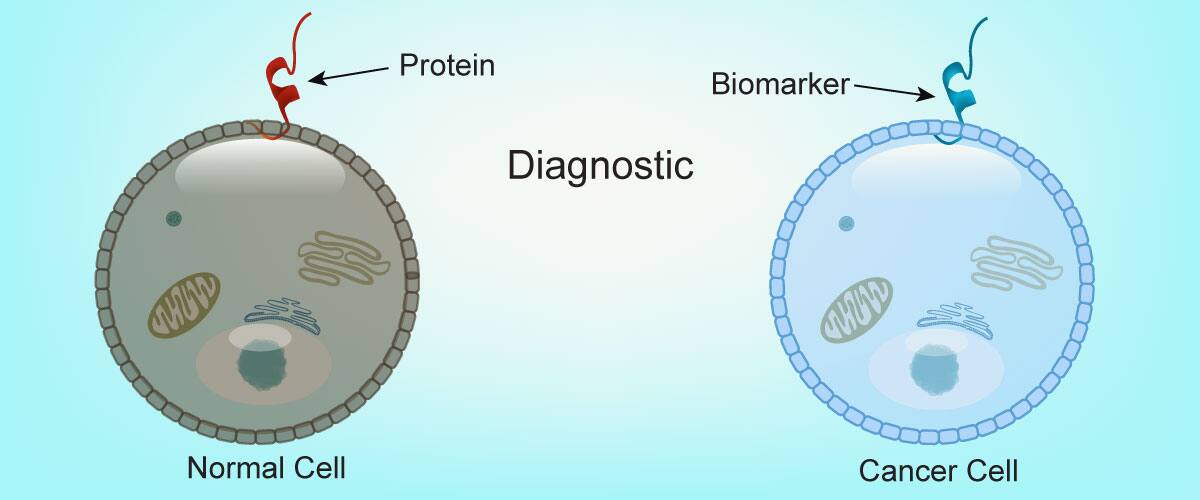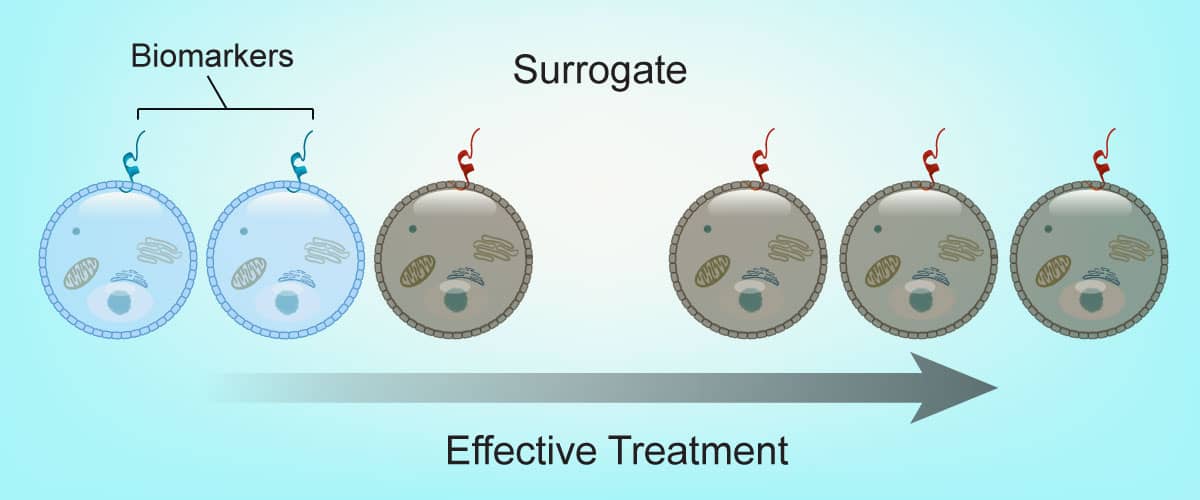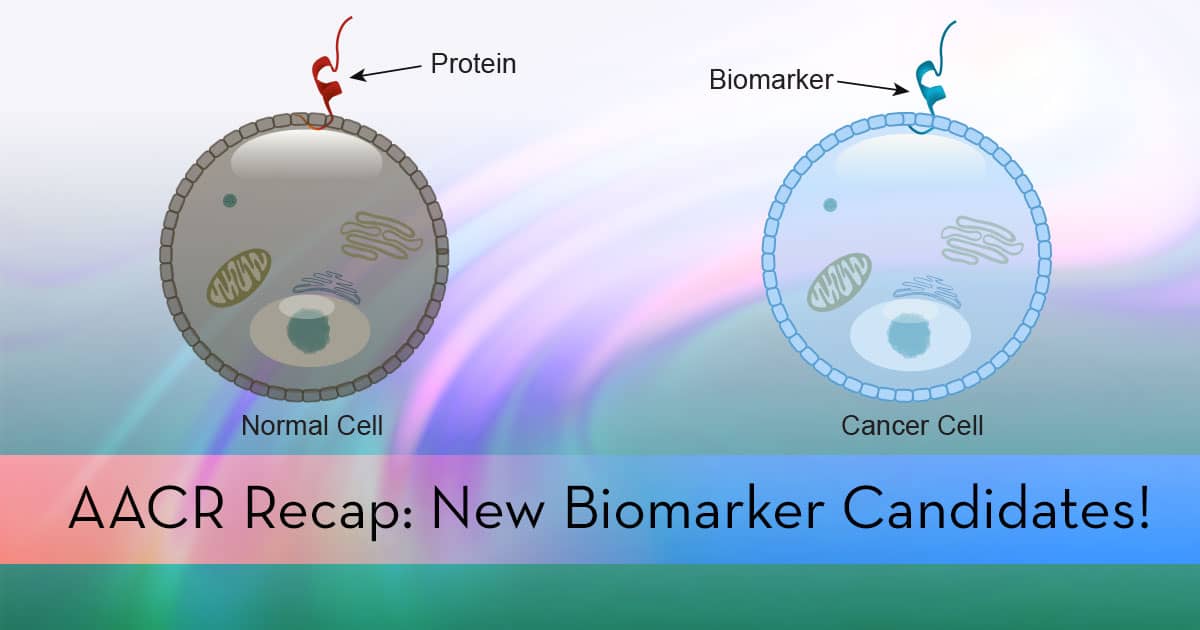AACR Recap #1: New Biomarker Candidates!
Most investigators agree that early detection increases the likelihood of a positive response to a given therapeutic intervention in cancer. Biomarkers are a necessary prerequisite for early detection. A healthcare provider needs some clue that cancer is likely to develop. More importantly, they need to know that the selected therapeutic intervention will be effective. It is no surprise then, that much of the work presented at the 2017 American Association for Cancer Research (AACR) was focused on discovering and validating novel cancer biomarkers.
Mahoney and Atkins describe four types of cancer biomarkers: diagnostic, surrogate, prognostic and predictive.

Diagnostic biomarkers are useful for diagnosing cancer. In this example, the biomarker distinguishes the normal cell from the cancer cell.

Surrogate biomarkers are stand-ins or proxies for cancer and its progression. In this example treatment efficacy is validated by lack of biomarker detection after a successful therapeutic intervention.

Prognostic biomarkers provide information about the risk cancer development or recurrence. In this example, early detection of a biomarker predicts cancer in the future.

Finally, Predictive biomarkers are useful for selecting an effective therapeutic intervention. In this example, therapeutic interventions that target the biomarker successfully eradicate cancer.
Although all validated biomarkers have an important role in the fight against cancer, predictive biomarkers are most useful. For example, expression of programmed death receptor 1 (PD-1) or programmed death receptor ligand 1 (PD-L1) in some types of cancer is correlated with increased efficacy of PD-1 or PD-L1 directed immunotherapy. By selecting cancer patients that are known to be responsive to a specific therapeutic intervention, clinicians are able to treat the disease more effectively.
It takes years of preclinical and clinical research to discover, test, and validate putative biomarkers. Bio-Techne is pleased to be able to partner with investigators as they strive to accomplish these challenging goals. Listed below is a mere fraction of the biomarker candidates discussed at AACR.
| Biomarker Candidate | Evidence |
| Thioredoxin reductase (TrxR1) | There is evidence that plasma TrxR1 could be a diagnostic marker for non-small cell lung cancer |
| Ataxia Telangiectasia mutated (ATM) | Loss of ATM may be associated with increased tumor sensitivity to platinum chemotherapy in colorectal cancer. |
| Wilms' Tumor 1 (WT1) | Although there is evidence that WT1 and p53 are prognostic markers for ovarian cancer, WT1 may also have predictive value. |
| Dopamine Receptor D2 (DRD2) | There is evidence that DRD2 is a prognostic and predictive marker in lymphoma and glioblastoma. |
| Cell Division Cycle 25A (CDC25A) | CDC25A expression may be predictive marker in advanced rectal cancer. |
| Aldehyde Dehydrogenase (ALDH1) | High ALDH1 expression in esophageal squamous cell carcinoma may be predictive of responsiveness to chemotherapy. |
| Insulin Receptor (InsR) | Nuclear InsR localization may be a prognostic biomarker in breast cancer. |
| Cluster of Differentiation 37 (CD37) | Also known as tetraspanin, CD37 expression is inversely proportional to PD-1 expression in diffuse large B-cell lymphoma. |
| α-1-Acid Glycoprotein (AAG) | There is evidence that AAG is a predictive and prognostic biomarker in non-small lung cancer. |
| Semaphorin 3C | Semaphorin 3C expression has been correlated with disease free survival in colorectal cancer patients. |
| UL 16 Binding Protein 1 (ULBP1) | ULBP1 and NKG2D expression may be a prognostic biomarker in gastric cancer. |
| Natural Killer Group 2 Member D (NKG2D) | ULBP1 and NKG2D expression may be a prognostic biomarker in gastric cancer. |
| Human Epidermal Growth Factor Receptor 4 (HER4) | There is evidence that HER4 expression may be a prognostic marker in FIGO stage III and IV cancer. |
| Sonic Hedgehog (Shh) | Data implicates shh as a possible prognostic biomarker in metastatic breast cancer. |
| Growth arrest-specific 6 (GAS6) | GAS6, a ligand for Axyl may be a prognostic biomarker in lung adenocarcinoma. |
| Axl | Axl may be a prognostic marker in lung adenocarcinoma. |
